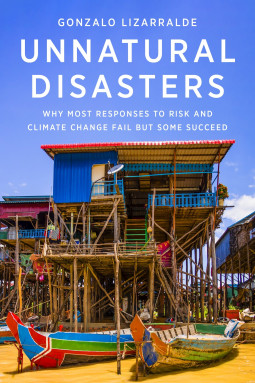
Unnatural Disasters
Why Most Responses to Risk and Climate Change Fail but Some Succeed
by Gonzalo Lizarralde
This title was previously available on NetGalley and is now archived.
Send NetGalley books directly to your Kindle or Kindle app
1
To read on a Kindle or Kindle app, please add kindle@netgalley.com as an approved email address to receive files in your Amazon account. Click here for step-by-step instructions.
2
Also find your Kindle email address within your Amazon account, and enter it here.
Pub Date Aug 10 2021 | Archive Date Nov 17 2021
Talking about this book? Use #UnnaturalDisasters #NetGalley. More hashtag tips!
Description
Unnatural Disasters offers a new perspective on our most pressing environmental and social challenges, revealing the gaps between abstract concepts like sustainability, resilience, and innovation and the real-world experiences of people living at risk. Gonzalo Lizarralde explains how the causes of disasters are not natural but all too human: inequality, segregation, marginalization, colonialism, neoliberalism, racism, and unrestrained capitalism. He tells the stories of Latin American migrants, Haitian earthquake survivors, Canadian climate activists, African slum dwellers, and other people resisting social and environmental injustices around the world. Lizarralde shows that most reconstruction and risk-reduction efforts exacerbate social inequalities. Some responses do produce meaningful changes, but they are rarely the ones powerful leaders have in mind.
This book reveals how disasters have become both the causes and consequences of today’s most urgent challenges and proposes achievable solutions to save a planet at risk, emphasizing the power citizens hold to change the current state of affairs.
Advance Praise
"In this book, Gonzalo Lizarralde tackles some of the most pressing and difficult questions the world faces today as we struggle to adapt to climate change and intensified disasters. The result is a valuable and unique compendium of wisdom and experience, full of insight into both environmental problems and human nature."
--David Alexander, Professor of Risk and Disaster Reduction, University College London
Available Editions
| EDITION | Other Format |
| ISBN | 9780231198103 |
| PRICE | $35.00 (USD) |
Average rating from 3 members
Featured Reviews
 Andrea K, Librarian
Andrea K, Librarian
The misuse of aid and donor funds in the aftermath of Haiti’s major earthquake awakened many to the complexities of disasters and recovery. Lizarralde, a world reknowned expert on disaster recovery points out the backward and often illogical approaches to disaster that often motivate both governments and private organizations. First, he notes that while violent natural events such as hurricanes and earthquakes are large,y beyond human control, the extent to which these natural events become disasters is usually determined by human preparedness and response. He criticizes approaches that are market driven, such as technological gadgets that fail to address root causes and housing developments that do not respect the priorities and cultures of residents. Lizarralde finds plenty to condemn in the approaches taken by most international experts but he also finds reasons to hope when local and national priorities are aligned with individual needs. A good corrective to the “sustainable and resilient” design rhetoric that dominates current discussions but seldom results in long term positive results,
Readers who liked this book also liked:
Marie Bostwick
Historical Fiction, Literary Fiction, Women's Fiction


















